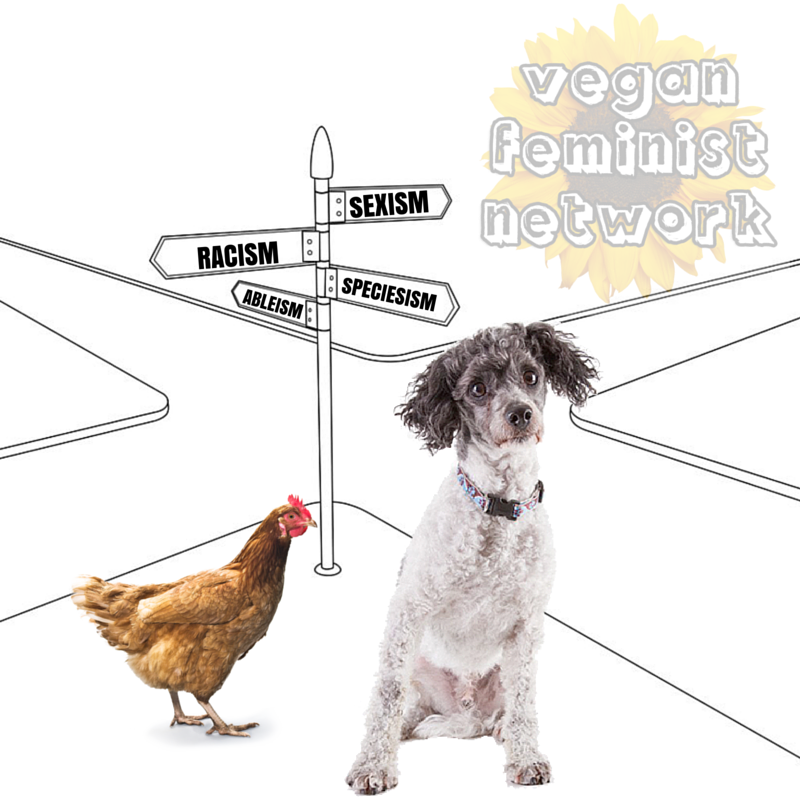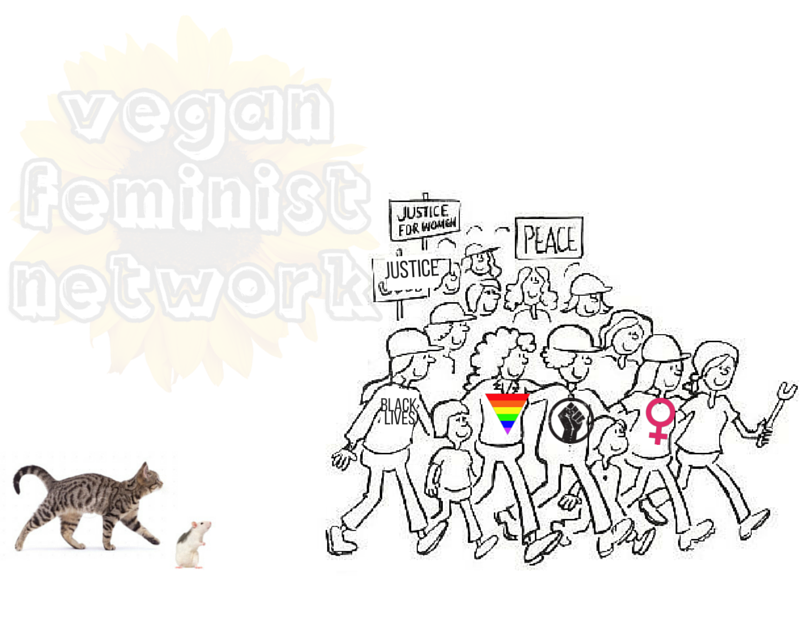With the growing popularity of intersectional approaches in vegan spaces, there is some concern about what this means for a meaningful anti-speciesist message. I have written at length on this topic in my book A Rational Approach to Animal Rights: Extensions in Abolitionist Theory, but offer this essay as a quick reference to readers. In short–intersectionality can be speciesist, but it need not be.
Developed in the context of Black feminism by Dr. Kimberlé Williams Crenshaw, intersectionality theory asks us to acknowledge how various forms of oppression are entangled with one another. Intersectionality theory insists that our struggle for social justice cannot be single-issue. For vegans, this means that we cannot advocate for Nonhuman Animals while ignoring (or aggravating) sexism, racism or any other “ism.” Doing so overlooks the root cause of injustice.
Intersectionality theory acknowledges that some individuals belong to multiple oppressed groups; their experiences cannot be fully understood with a single-issue analysis. For instance, Black feminists insist that any feminism lacking a critical race component is insufficient or incomplete: Black women’s experiences are not always comparable to that of white women. Women’s liberation efforts which fail to acknowledge this difference will be disjointed and fall short of success. Racism and sexism are not the same, but they manifest similarly. Thus, leaving any group behind leaves the system intact.
While intersectionality is a theory of Black feminism, it can also be applied to understand other complex identities. Consider how a dog’s experience is different from that of a human. Consider also how a disabled dog’s experience will be markedly different from that of an able-bodied dog in a human supremacist and ableist society. Intersectionality theory asks us to be conscious of differences in experience, and the complexities of oppression. Intersectionality is about awareness to difference.
However, some have suggested that intersectionality displaces the centrality of Nonhuman Animal suffering in the vegan movement. Some have also suggested that intersectionality somehow opens up the door for anyone and everyone to claim to victimhood, thus absconding them from their responsibilities for anti-speciesist political engagement.
This simply isn’t the case. A pro-intersectional approach acknowledges the reality of oppression and seeks to uproot it. Racism, sexism, speciesism, etc. all rely on similar mechanisms (in-group/out-group maintenance, stereotypes, objectification, etc.) and manifest in similar ways. A pro-intersectional approach only seeks to acknowledge and accommodate these unique positions in society in our collective journey to justice.
We may have cross-cultural moral universals (such as the renunciation of unnecessary violence), but there is no one-size-fits-all moral solution. In an ideal world, all humans would be vegan. But the world is teeming with intersecting oppressions, and veganism is not (or may not appear to be) attainable. It’s our job to make it so. Intersectionality is a political approach, not a hands-off, live and let live resignation.
Importantly, abetting oppression is never part of intersectionality’s accommodation of difference. This is why vegan pro-intersectionalists firmly reject all welfare reforms and single-issue campaigns, which have been shown to be ideologically problematic and empirically counterproductive. Some non-vegan/plant-based intersectionalists take no position on the capitalist co-optation of non-profits or the agricultural industry’s manipulation of post-speciesist ideologies. They may also suggest that veganism is what you make of it. But this position is not universally accepted.
As I understand it, veganism is a political expression of anti-speciesism. It is not just about the personal; it is first and foremost about the collective. Plant-based diets can certainly be liberatory, anti-colonial, feminist, or anti-racist, but a plant-based diet without the anti-speciesist element ultimately stops short of our obligations to other animals.
I’m not the vegan police; I can’t tell communities living in life-or-death situations how to manage their scant resources and it’s not my business to tell others how to self-identify. Nonetheless, it is important to be clear: eating plant-based foods while still engaging in speciesist actions is problematic. It is ethically problematic to wear “leather” or “wool.” It is ethically problematic to vacation to Seaworld or buy “purebred” dogs. It is ethically problematic to support PETA and the HSUS as well, because these organizations promote institutionalized violence against animals.
So, intersectionality can be speciesist if it fails to meaningfully incorporate a vegan ethic. But then, intersectionality theory in practice has never been perfect. There are lots of non-vegan feminists, heterosexist anti-racists, sexist gay liberationists, etc. Many activists claim to both understand the connections and live by them, but research indicates that all social movements are grappling with internal discrimination. This is not good, of course, but there is no need to throw the baby out with the bathwater.
We must still be accountable to the marginalized. For those of us identifying as “vegan,” we must be vigilant in our obligation to embrace an anti-speciesist position so as not to aggravate systemic violence against Nonhuman Animals. To do so, we must first live up to our own potential. Second, we must also use whatever privilege we enjoy to help others do the same. Recognizing that oppression impacts some communities in ways that makes their participation in social justice difficult, it’s up to activists to find solutions to break down those barriers.
Perhaps most importantly, we should be listening and lending platform to those folks engaging this difficult work who are themselves part of those communities. If marginalized human groups were given support, encouragement, and resources instead of being hassled, derided, and patronized by wealthy white vegans, we could see some serious change. Vegans with relative privilege should be wary of imposing their unique worldview unrealistically on vulnerable groups (who, by the way, became vulnerable in the creation of said privilege; this is no circumstance of chance). White-identified vegans in particular should beware of the white savior complex, as this mindset can replicate patterns of oppression. Privileged people will need to get comfortable with relinquishing control. After all, equal access and equal representation will be the new status quo in a liberated society, will it not?
We need to promote veganism for Nonhuman Animal liberation, but we can’t do so if we build a wall between ourselves and our audience. The anti-speciesist vegan movement has much to inform other movements, but we must remember that other movements have much to inform us, too. This is how bridges are built, solidarity is nurtured, and oppression is dismantled. If we want liberation, this step is not optional.
The Nonhuman Animal rights movement must prioritize coalition-building. In doing so, however, we must be clear about our obligations to other animals. Veganism should be encouraged and engaged when possible, and single-issue campaigns that compromise the well-being of Nonhuman Animals should be firmly rejected.
Some activists working in vegan spaces come to the table from other movements and do not include Nonhuman Animals in their advocacy, or, they may promote speciesist non-profits or speciesist tactics. I am sensitive to the fact that some people occupy more precarious social positions and must prioritize other justice campaigns. I am also deeply committed to supporting the efforts of others wherever it is ethical to do so. Raising anti-speciesist awareness in sister movements is a worthy goal, as is raising our own awareness to the struggles of others.
The only vegan pro-intersectionality I condone is that which embraces and acknowledges other forms of oppression without undermining our obligations to other animals. Indeed, a position is hardly intersectional if it works to ignore, invisibilize, or further marginalize any oppressed group–human or not.
You can read more about the importance of species-inclusive intersectionality in A Rational Approach to Animal Rights: Extensions in Abolitionist Theory (Palgrave 2016).
 Dr. Wrenn is the founder of Vegan Feminist Network. She is a Lecturer of Sociology with Monmouth University, council member with the Animals & Society Section of the American Sociological Association, and an advisory board member with the International Network for Social Studies on Vegetarianism and Veganism with the University of Vienna. She was awarded Exemplary Diversity Scholar 2016 by the University of Michigan’s National Center for Institutional Diversity. She is the author of A Rational Approach to Animal Rights: Extensions in Abolitionist Theory.
Dr. Wrenn is the founder of Vegan Feminist Network. She is a Lecturer of Sociology with Monmouth University, council member with the Animals & Society Section of the American Sociological Association, and an advisory board member with the International Network for Social Studies on Vegetarianism and Veganism with the University of Vienna. She was awarded Exemplary Diversity Scholar 2016 by the University of Michigan’s National Center for Institutional Diversity. She is the author of A Rational Approach to Animal Rights: Extensions in Abolitionist Theory.



